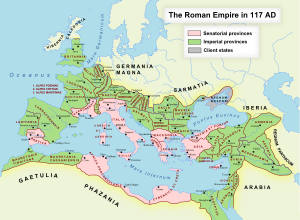Mare Nostrum facts for kids

Mare Nostrum is a Latin phrase that means "Our Sea." The Romans first used this name for the Mediterranean Sea. Later, after Italy became one country in 1861, Italian nationalists started using the term again. They wanted Italy to be as powerful as the old Roman Empire.
Contents
How Romans Used "Our Sea"
The Romans first used the term mare nostrum to talk about the Tyrrhenian Sea. This was after they took control of nearby lands like Sicily, Sardinia, and Corsica. This happened during the Punic Wars against Carthage.
By 30 BC, the Romans had conquered all the lands around the Mediterranean Sea. Their empire stretched from the Iberian Peninsula (modern-day Spain and Portugal) all the way to Egypt. At this point, they began calling the entire Mediterranean Sea mare nostrum. They also used other names, like Mare Internum ("The Internal Sea"). The name "Mediterranean" came much later.
Italian Nationalists and "Our Sea"
In the 1880s, many Italians became interested in nationalism. This was a time when other European countries were creating colonies in Africa. This period is often called the "Scramble for Africa". Italian nationalists wanted Italy to have its own colonies in Africa too.
The Italian poet Emilio Lupi used the term mare nostrum to support this idea. He once said:
Even if the coast of Tripoli were a desert, we still need to take it to avoid being suffocated in mare nostrum.
—Emilio Lupi
This quote shows how important they thought controlling the Mediterranean was for Italy's future.
Mussolini's Dream for "Our Sea"
The term mare nostrum was used again by Benito Mussolini. He was the leader of fascist Italy. He used it as part of his propaganda to make Italy seem strong. Mussolini wanted Italy to be as great as the Roman Empire once was. He believed that Italy was the most powerful country around the Mediterranean after World War I.
Mussolini even said that "the twentieth century will be a century of Italian power." He built a strong navy to help Italy control the Mediterranean Sea.
When World War II began, Italy already controlled the northern and southern parts of the central Mediterranean. The western part was held by Spain and France. The eastern part was controlled by Greece, Turkey, and the British Empire.
In 1940, France was defeated, which removed a big threat from the west. Italy then invaded Greece and Egypt. They also attacked the island of Malta. Mussolini often spoke about making the Mediterranean "an Italian lake."
Italy and Germany (called the Axis powers) defeated Greece. However, they could not defeat the British in Egypt. For the next three years, they fought many battles there in what was called the Western Desert Campaign. The British and Italian navies also fought at sea in the Battle of the Mediterranean. By 1943, the Axis forces in North Africa were defeated. In September 1943, Italy was invaded and forced to surrender.
"Our Sea" Today
The name "Mare Nostrum" is still used today in different ways. For example, a conference about Mediterranean law and culture used the name in June 2012. This meeting was held at the University of Cagliari in Sardinia. Here, "Mare Nostrum" meant all the different cultures around the Mediterranean. It also meant working together and sharing ideas among these nations.
In 2013, a shipwreck happened near Lampedusa. Many people trying to cross the sea from Africa needed to be rescued. Because of this, the Italian government increased its patrols in the Mediterranean Sea. They called this effort "Operation Mare Nostrum". It was a military and humanitarian mission. Its goals were to rescue migrants and to arrest people who illegally transported them.
Images for kids
-
The Roman Empire at its farthest extent in AD 117. Note, however, that the Sea is called Mare Internum, "Inner Sea," on this map.
-
Map of the Italian Mare Nostrum in the summer of 1942, during the World War II: in green the territories controlled by the Italian Navy, in red the territories controlled by the Allies.
-
Fenice is one of the eight corvettes of Minerva class with the role of surveillance of fisheries; from November 2013 it took part in the Operation Mare Nostrum rescuing the boats of illegal immigrants coming from North Africa.
See also
 In Spanish: Mare nostrum para niños
In Spanish: Mare nostrum para niños
 | Jackie Robinson |
 | Jack Johnson |
 | Althea Gibson |
 | Arthur Ashe |
 | Muhammad Ali |




